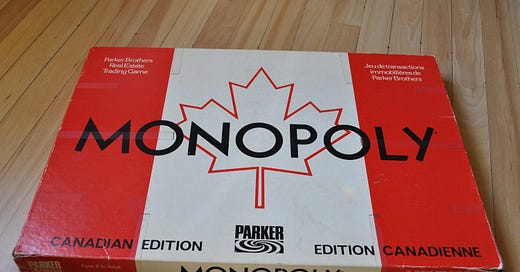The True North, Strong and Monopolized
We have a problem in Canada - and it's not just about the consumer getting hosed
Everybody loves a game of Monopoly, except for when that game means we pay some of the highest prices in the world for necessities like cell service, home internet, groceries, banking, and air travel.
And what’s worse – the perpetrators in this game haven’t been hit with the ‘go directly to jail – do not pass Go, do not collect $200’ card – instead, they’re being protected, and even encouraged, by the federal government.
First, let’s take a step back and get a lay of the land here.
Rogers, Telus, and Bell control 85% of the Canadian wireless market.
Six banks own 90% of all Canadian mortgages.
Five grocery stores have cornered 87% of the grocery business.
And just two airlines – WestJet and Air Canada – have locked down over 80% of our airline market.
All this monopolizing might drive you to drink, but even beer is one of
the most monopolistic sectors in Canada. Two American companies, Anheuser-Busch and Molson Coors, capture an 85% market share.
What does this mean for Canadian consumers? It means that we’re worse off, paying higher prices for poorer services. For instance, Rogers, Bell, and Telus were ranked the first, second, and third costliest providers out of 168 wireless companies in 48 developed countries. Our airlines don’t run on time, and it can cost over $1,000 for a round-trip flight in from Toronto to Vancouver. We pay exorbitant fees just for basic services like chequing accounts.
Monopolies don’t just cost us in the pocketbook, although they’re good at that. They bring larger costs, too – lower investment, lower productivity, lower wages, and greater wealth inequality. It’s next to impossible for startups or innovators to disrupt or enter the market.
We might think that expensive groceries and costly phone plans are just par for the course for everyone, everywhere. But that’s not the case. For instance, our cellular bills are three times more expensive than Australia’s, and two times more expensive than the U.S.’s or Europe’s. Outlandish prices for basic services are a uniquely Canadian phenomenon – a phenomenon we have created and are now actively protecting.
We are a nation of monopolies – we were even founded on a monopoly, the Hudson’s Bay Company. There are lots of things about Canada we should be protecting right now, but our status as monopolizer isn’t one of them.
But that’s exactly what the government is doing.
Many countries, like the US and the UK, have adopted what’s known as ‘open banking’ – allowing users to have access to their banking data and share it with trusted third parties (think: wealth management apps or financial services providers), curbing the power and influence of established banks. But not Canada.
Others allow ‘cabotage’ in the airline industry – letting foreign carriers operate flights on certain domestic routes to bring down ticket prices. But this has been shot down by restrictive legislation and regulation.
Other proposals have reached the desks of bureaucrats in Ottawa – like ideas to allow more competitors in the Canadian wireless market or greater access to important infrastructure. But they’ve died on arrival – protected by those who have an interest in protecting the status quo.
And when the government isn’t protecting monopolies in Canada – they’re actively making them worse.
They allowed Rogers, the third largest telecommunications company, to merge with Shaw, the fourth largest. They let RBC take over HSBC – same with National Bank and CWB. Don’t forget about WestJet and Sunwing. It’s not just the big names either – in Canada’s most concentrated industries, market power and concentration grew between 2000 and 2020.
The status quo isn’t working for Canadians. Nobody likes paying absurd phone bills or waiting three hours on hold for the privilege of paying it. It’s not working for players like small businesses, who are getting squeezed out of established industries or facing high barriers preventing them from entering at all. And in a newfound age of economic instability, it’s not working for a Canadian economy that desperately needs a shot in the arm.
The solution is simple – lower barriers for businesses and more choice for Canadians. It comes down to the same argument from my last post: more economic freedom – a greater ability for consumers to choose and make the best choice for them – benefits everybody in a market-based economy.
The federal government can legislate this freedom – it has jurisdiction over huge bureaucracies like the CRTC, the Competition Bureau, and major pieces of legislation that govern Canadian markets. Which makes our economic stagnation and protection of monopolies it all the more frustrating.
We have a new Prime Minister and a ‘new’ government, who have expressed openness to departing from the status quo and experimenting with new ideas. We should all hope that Mark Carney will choose to side with Canadian consumers and our national economic interest, instead of siding with well-connected corporate allies. But if the last ten years of Liberal governance and Mark Carney’s own career history are instructive, I’m not particularly hopeful for any major changes.
On the Conservative side – we know that the dangerous and destructive game of Canadian Monopoly needs to end, and fast. My colleagues and I are looking forward to continuing the great work of my friend and colleague, Ryan Williams, to put forward more solutions and build an economy that works for consumers and families, not the well-established and powerful monopolies.
Tell me below in the comments: what legislative and policy changes would you like to see to fix Canada’s monopoly problem?



